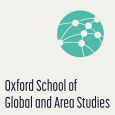ASEAN Institute
The University of Oxford’s ASEAN Institute will have unrivalled reach and impact. OSGA promises an academic programme that will enhance the visibility of Southeast Asian studies within the University, the United Kingdom and around the world. Supported by Oxford’s existing status as a recognised world-leader in academic area studies, the new Institute will also become an important global hub for discussion among academics, policymakers and private enterprise. It will produce policy papers and scholarly publications, and provide curriculum resources.
The ASEAN Institute will also focus on training outstanding students from Southeast Asia and the rest of the world, equipping them with graduate degrees in relevant areas of study across the social sciences and humanities.
This Institute will facilitate fruitful exchanges of students and faculty between Oxford and Southeast Asian universities. It will support mutually beneficial and ground-breaking research in ASEAN countries. Instrumental to this vision is the establishment of six new associate professorships. These will be shared posts with a broad range of outstanding University departments.
We anticipate their specialisms to be:
Environmental sustainability of Southeast Asia: studying the management of natural and cultural habitats across different countries in Southeast Asia; the varied experiences of climate change and pollution challenges; struggles over natural resources; and the implications of technologies, urbanisation and global value chains for food production and food consumption.
Regional governance of Southeast Asia: studying the diversity in public policy, governance and administration across different countries in the region. The post-holder will explore the intersection of local, regional and global dynamics on public policy formation and in-depth case studies of administrative and governance reforms; and how state, business and civil society interact to shape national and public policy agendas across ASEAN.
Politics and international relations of Southeast Asia: studying the diverse political systems of countries in the region; national responses to human security challenges, such as crime and poverty; regional and international security issues; and the implications of the rise of Southeast Asian nations for the regional and global order.
Political economy of Southeast Asia: studying the political and institutional underpinnings of the dramatic economic growth and structural transformation across the region. This incorporates attention to state interventions in markets; the politics of public infrastructure investment; state and corporate relations; labour movements and industrial relations; and multilateral and exclusive trade relations in the region and beyond. Furthermore, the post-holder will explore the expansion of sub-regional economic growth zones, as the global economic centre of gravity increasingly shifts toward the region.
Digital economy of Southeast Asia: studying the expansion of the digital economy of Southeast Asia and exploring how those changes are transforming societies, while creating dynamic changes. The post-holder will research the impacts of changing connectivity on economies, societies and politics throughout Southeast Asia.
History of Southeast Asia: studying Southeast Asia over the 18th, 19th and 20th centuries, including the interaction between indigenous states and wider trading networks and seaborne powers; the experience of western colonialism, decolonisation and nationalism; the dynamics of social and religious change; and the influence of historical memory and representation in the contemporary era.
These six key posts will expand the University’s ability to host and facilitate dialogue and exchange with Southeast Asian scholars and institutions. The ASEAN Institute will provide a thriving environment for teaching a new generation of students from all over the world in Southeast Asia studies. We aim to bring the wealth of Southeast Asian experiences and perspectives into wider comparative debates about the world, and highlight the study of Southeast Asia within diverse disciplines. This will ensure even wider and deeper exposure to Southeast Asian nations, and a greater understanding of this vital region.
The establishment of a world-leading ASEAN Institute at the University of Oxford moved closer today (October 10 2018) with a Royal launch for the campaign in support of the academic initiative.
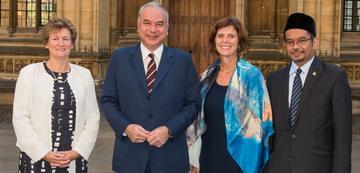
Professor Louise Richardson, Oxford's Vice-Chancellor, and Professor Sarah Whatmore, Head of the Division of Social Sciences, welcomed His Royal Highness Sultan Nazrin Shah, the Deputy King of Malaysia, to the institution's historic Sheldonian Theatre. Sultan Nazrin – who serves as Chancellor of the University of Malaya – is a political economist and active scholar with longstanding interest in the socio-economic development of Malaysia and its surrounding region. An Oxford graduate in Philosophy, Politics and Economics (BA Hons), he also holds higher degrees in Public Administration (Masters) and Political Economy and Government (PhD) from Harvard University.
Welcoming the ASEAN Institute initiative, HRH The Sultan, as Patron to the Institute, said: 'By creating a dedicated focus for research and teaching excellence in Southeast Asia Studies, Oxford will make a significant contribution to the global academy. Very few universities in the world can match Oxford for the range and intensity of its academic expertise. This ambitious, thoughtfully-integrated knowledge enterprise will put Southeast Asia at its heart, benefitting both the citizens of the ASEAN (Association of Southeast Asian Nations) countries and the people of the wider world.'
The new ASEAN Institute will be part of the Oxford School of Global and Area Studies. It is expected to create research and teaching opportunities to be shared across several departments including Geography and the Environment, Politics and International Relations, Development Studies, and History.
Oxford was last week rated overall number one in the Times Higher Education World University Rankings for a third successive year. Establishing Southeast Asia Studies as an area of dedicated focus will further strengthen the University’s research and global reach. Oxford is also currently top-ranked in both the Social Sciences and Medical Sciences.
A strategic partnership
Introduction

Southeast Asia is rich in history and cultural traditions, with an economic dynamism that is creating rapid change and burgeoning global influence. It has a fast-growing middle class, increasing investments in education, an expanding tourism industry, and industrialised dynamic regions with buoyant opportunities for international trade and investment. Against the backdrop of this thriving economy, the UK, in particular, is strengthening its focus on relations with Southeast Asia.
As well as its rich cultural and social history, the region has a fertile recent history of social movements and politically active citizens. It displays a remarkable diversity of political regimes, potent economic development, vibrant religious landscapes and cultural characteristics. It is also home to some of the most successful transformations in society. To understand the exponential changes taking place in this important region and their potential consequences for the world, it is essential to assemble a community of specialists at the forefront of scholarship, whose work gives the region due attention, has tangible relevance and impact, and can facilitate fruitful exchange of ideas.
The University of Oxford plans to address these needs by creating a new, permanent ASEAN Institute. The Institute will be based at the Oxford School of Global and Area Studies (OSGA) and will have shared posts and teaching across several other key University departments: Geography and the Environment; Museum Ethnography; Politics and International Relations; Development Studies; History; the Blavatnik School of Government; and the Oxford Internet Institute. Fellows and students in this new University Institute may be associated with a number of colleges and all will benefit from:
i. the special relationship between OSGA and St Antony’s College, which is the established intellectual hub for Area Studies scholars and activities across the University
ii. the formidable strengths of Oxford’s libraries and museums, which contain some of the world’s most significant resources on Southeast Asia.
The centre will act as a global resource for knowledge, analysis and teaching, and will play a pivotal role in forging connections, nurturing talent from the region, and expanding opportunities for collaboration.
Establishing a world-leading ASEAN Institute
The University of Oxford’s ASEAN Institute will have unrivalled reach and impact.
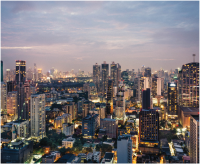
OSGA promises a programme that will enhance the visibility of Southeast Asian studies within the University, the United Kingdom and around the world. Supported by Oxford’s existing status as the recognised world-leader in academic area studies, the new Institute will become an important global hub for discussion among academics, policymakers and private enterprise. It will produce policy papers and scholarly publications, and provide curriculum resources.
The Institute will also focus on training outstanding students from Southeast Asia and the rest of the world, equipping them with graduate degrees in relevant areas of study across the social sciences and humanities.
This Institute will facilitate fruitful exchanges of students and faculty between Oxford and Southeast Asian universities. It will support mutually beneficial and groundbreaking research in ASEAN countries. Instrumental to this vision is the establishment of six new associate professorships. These will be shared posts with a broad range of our outstanding departments.
We anticipate their specialisms to be:
• Environmental sustainability of Southeast Asia to study the management of natural and cultural habitats across different countries; the varied experiences of climate change and pollution challenges; struggles over natural resources; and the implications of technologies, urbanisation and global value chains for food production and food consumption.
• Regional governance (ASEAN) to study the diversity in public policy, governance and administration in different countries in the region. The post-holder will explore the intersection of local, regional and global dynamics on public policy formation and in-depth case studies of administrative and governance reforms; and how state, business and civil society interact to shape national and ASEAN public policy agendas.
• Politics and international relations of Southeast Asia to explore the diverse political systems of countries in the region; national responses to human security challenges, such as crime and poverty; regional and international security issues; and the implications of the rise of Southeast Asian nations for the regional and global order.
• Political economy of Southeast Asia to explore the political and institutional underpinnings of the dramatic economic growth and structural transformation across the region. This incorporates attention to state interventions in markets; the politics of public infrastructure investment; state and corporate relations; labour movements and industrial relations; and multilateral and exclusive trade relations in the region and beyond. Furthermore, the postholder will explore the expansion of sub-regional economic growth zones, as the global economic centre of gravity increasingly shifts toward the region.
• Digital economy of Southeast Asia to study the expansion of the digital economy of Southeast Asia and explore how those changes are transforming societies, while creating dynamic changes. The postholder will study the impacts of changing connectivity on economies, societies and politics throughout Southeast Asia.
• History of Southeast Asia to study Southeast Asia over the 18th, 19th and 20th centuries, including the interaction between indigenous states and wider trading networks and seaborne powers; the experience of western colonialism, decolonisation and nationalism; the dynamics of social and religious change; and the influence of historical memory and representation in the contemporary era.
These six key posts will expand the University’s ability to host and facilitate dialogue and exchange with Southeast Asian scholars and institutions. The Institute will provide a thriving environment for teaching a new generation of students from all over the world in Southeast Asia studies. We aim to bring the wealth of Southeast Asian experiences and perspectives into wider comparative debates about the world, and highlight the study of Southeast Asia within diverse disciplines. This will ensure even wider and deeper exposure to Southeast Asian nations, and a greater understanding of this vital region.

“By creating a dedicated focus for research and teaching excellence in Southeast Asian Studies, Oxford will make a significant contribution to the global academy. Very few universities in the world can match Oxford for the range and intensity of its academic expertise. This ambitious, thoughtfully-integrated knowledge enterprise will put Southeast Asia at its heart, benefitting both the citizens of the ASEAN countries and the people of the wider world.”
HRH Sultan Nazrin Shah, Patron to the ASEAN Institute
The Oxford School of Global and Area Studies
The University of Oxford has been ranked number one in the Times Higher Education World University Rankings in seven successive years since 2017. In the UK Government’s last Research Excellence Framework (REF 2021), Oxford submitted the highest volume of world-leading research. In REF 2021, Oxford submitted more world-leading research in Area Studies research than any other University in the UK.
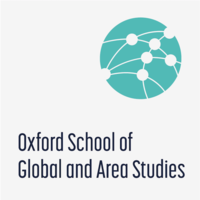
The Oxford School of Global and Area Studies (OSGA) boasts the one of the largest communities of area studies scholars anywhere in the world. It has internationally renowned research and teaching programmes dedicated to Africa, China, Israel, Japan, Latin America, Russia and Eastern Europe, the Middle East, and South Asia.
OSGA faculty speak the languages of the regions they study and spend much time on collaborative projects with academics in the region. OSGA scholars’ expertise runs deep and wide; it extends from the village or the town up to regional and national levels; and it reaches into the past to help understand the present, while remaining informed by a deep understanding of real-world events. Our researchers provide commentary to media outlets, governments and think tanks.
OSGA’s 160-plus postgraduate students come from around the world. They arrive in Oxford with prior study and work experience across a range of fields. OSGA classrooms and seminars host the kinds of conversations that seldom happen anywhere else, by bringing together faculty, visiting scholars and students from diverse backgrounds in a trusted and neutral space. OSGA seeks to ensure that the vital study of Southeast Asia attracts the same resources and profile as our activities covering other regions.
Impact
Over the years, superbly trained graduates of OSGA have gone on to significant roles around the world. Many have pursued doctoral studies and teaching careers, thus preserving crucial intellectual capital in their regional specialisms. Other graduates have taken up high-profile posts within international agencies, global NGOs, international governments and ministries, the diplomatic services of various countries, the military, media and journalism, business consultancy, banking and law, and the arts.
With the establishment of an ASEAN Institute, OSGA will bring new focus to the study and teaching of Southeast Asia.
The Institute and its academics will conduct world-leading research, bringing together the best experts in Oxford and the wider world to share their insights and knowledge. The Institute will become crucial, both in educating the brightest and most talented students as future experts in the region, and as a promoter of knowledge and understanding of Southeast Asia as a key player in the global order. It will also build collaborative links with researchers and institutions in Southeast Asia, to enhance research capacity within this vibrant and dynamic region.
Next steps
We hope that this document demonstrates the University of Oxford’s commitment to establishing a world-leading ASEAN Institute.
We look forward to discussing this opportunity with you further and advancing our shared vision.
Contact details
If you would like more information, please contact:
Professor Timothy J. Power, Head of Social Sciences Division, University of Oxford
Hayes House, 75 George Street, Oxford OX1 2BQ, United Kingdom
Tel: +44 (0)1865 614853 timothy.power@socsci.ox.ac.uk
Rachel Kirwan, Head of Development Social Sciences, University of Oxford
Hayes House, 75 George Street, Oxford OX1 2BQ, United Kingdom
Tel +44 (0)1865 611554 rachel.kirwan@devoff.ox.ac.uk
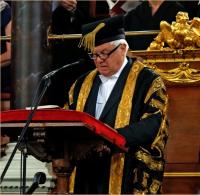
“The University of Oxford makes a priceless and distinctive contribution to the lives of people on an international scale. We are delighted that this opportunity has arisen to work with visionary benefactors to strengthen Oxford’s ties with the ASEAN countries. It is my fervent hope that we can go forward together, and help build a better world.”
Lord Patten of Barnes, Chancellor of the University of Oxford
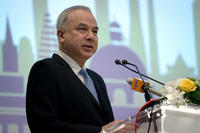
HRH The Sultan was speaking at a celebration dinner in support of the new Institute attended by the Chancellor of Oxford University, Lord Patten of Barnes and Professor Sarah Whatmore, Head of the University’s Division of Social Sciences.
Speaking at the dinner in Kuala Lumpur His Royal Highness gave further details of the new academic Institute, which was launched at Oxford’s historic Sheldonian Theatre last October and of which he is patron. The Institute will be part of the Oxford School of Global and Area Studies, creating a dedicated focus for research and teaching excellence in academic study of the ASEAN countries.
Sultan Nazrin, who serves as Chancellor of the University of Malaya and is himself a political economist and active scholar, said: “I hope that the Institute will not only produce outstanding research, but also communicate it to the world. I want both Oxford graduates and the general public to learn more about the excellent research of leading scholars from the region, giving people an insight into how human experience might be theorised and understood from Southeast Asia’s vantage point.”
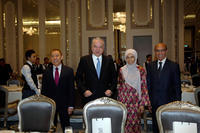
Oxford University’s Chancellor and the former Governor of Hong Kong, Lord Patten of Barnes, thanked HRH the Sultan for his work as sponsor on the project. Lord Patten said: “There could not be anyone better and more qualified to do this.
We are particularly delighted, because this is such an important project for us.
We want to create the best centre for studying, researching and teaching about Southeast Asia, not just in Britain, but in Europe. Southeast Asia is probably the most significant archipelago in the world with a hugely important part to play in the 21st century. Its challenges range from environmental sustainability, to issues of regional governance. We look forward to collaborating with the universities and businesses in the region in creating a centre which is equal to the exciting tasks which lie ahead.”
The ASEAN Institute is expected to create research and teaching opportunities to be shared across several departments including Geography and the Environment, Museum Ethnography, Politics and International Relations, Development Studies, and History. The aim is for it to be fully established in the next two to three years.
Oxford has been rated overall number one in the Times Higher Education World University Rankings for three successive years. Oxford is also top-ranked globally for the Social Sciences. Establishing Southeast Asian Studies as an area of dedicated focus will further strengthen the University’s research and global reach.
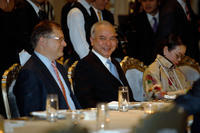
HRH Sultan Nazrin Shah has served as Co-Chair of the United Nations High-Level Panel on Humanitarian Financing, as well as Malaysia’s Special Envoy for Interfaith and Inter-Civilisational Dialogue at the United Nations Alliance of Civilisations (UNAOC). He is also Patron of the Malaysia International Islamic Financial Centre; Fellow of the Chancellor’s Court of Benefactors at the University of Oxford; Vice-Chair of the Board of Trustees of the Oxford Centre for Islamic Studies; Honorary Fellow of Worcester College, Oxford, and of Magdalene College and St Edmund’s College, both Cambridge. An Oxford graduate in Philosophy, Politics and Economics (BA Hons), he also holds higher degrees in Public Administration (Masters) and Political Economy and Government (PhD) from Harvard University
His Royal Highness is the author of Charting the Economy (OUP, 2017) and has published academic papers on the history and the economy of Malaysia.
For further information, or pictures of the event, please contact Stephen Rouse, Oxford University News and Information Office on +44 (0)1865 280533 or news.office@admin.ox.ac.uk
Pictures by Izuddin Razak/fotoBERNAMA
Giving to the Oxford School of Global and Area Studies
The School is devoted to research and graduate teaching in academic disciplines which attempt to understand the complexity and the interrelatedness of society through anthropology, economics, politics, history, sociology and culture. Its teaching and research seek to take into account both the insights provided by the separate disciplines and the contextualisation provided by in depth knowledge of specific regions and countries.
There are a number of ways you can support the Oxford School of Global and Area Studies - either through supporting our region-specific research centres, supporting our new Institute of ASEAN Studies, or support for graduate scholarships for our Global Area Studies programme.
For more information on how to support, please contact rachel.kirwan@devoff.ox.ac.uk
or click here to make a Donation

